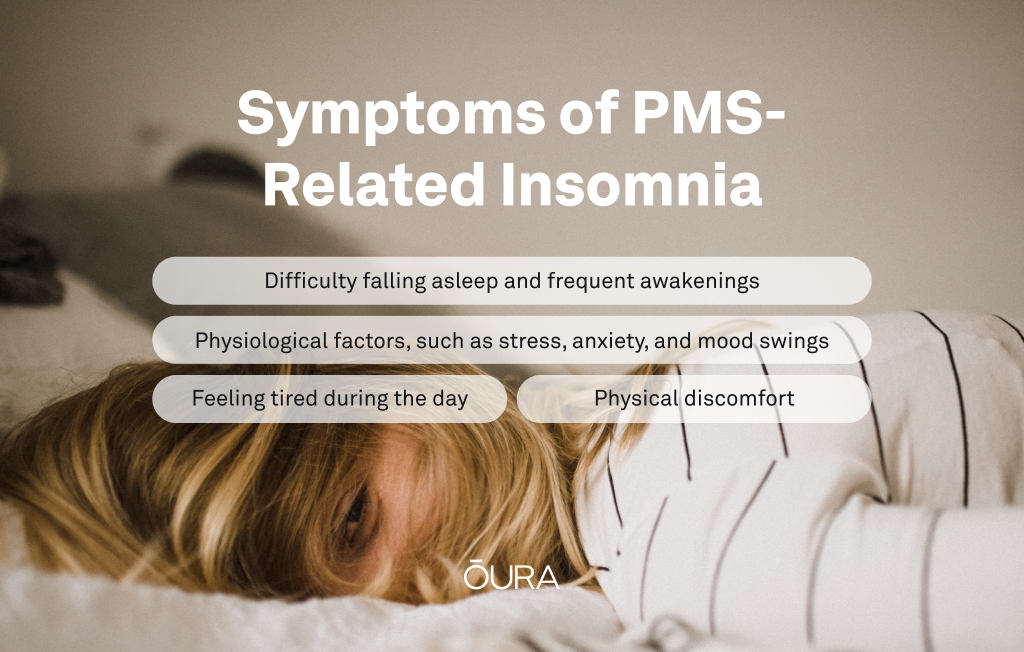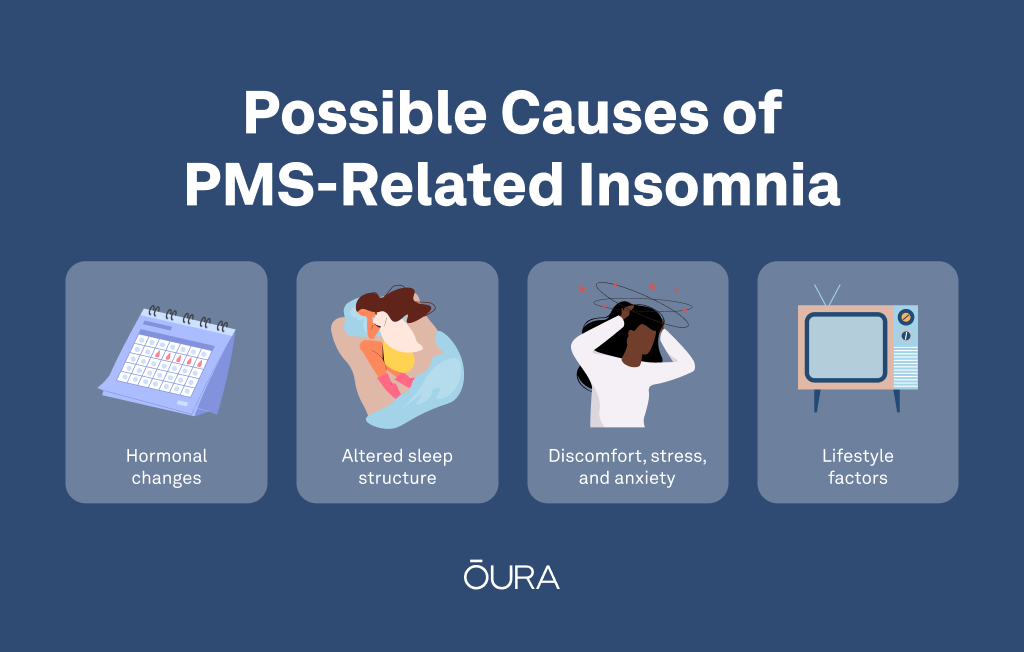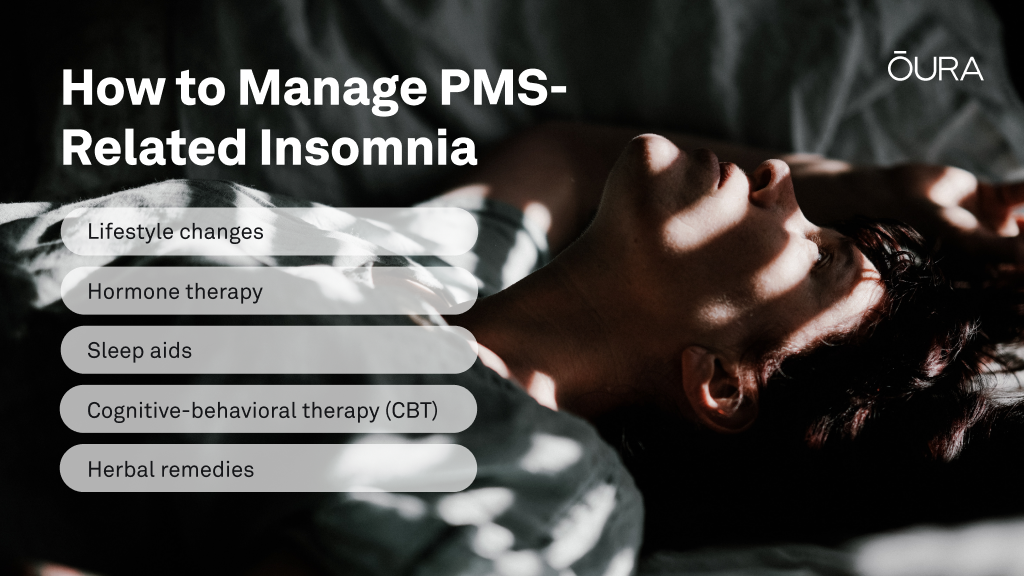In today’s busy world, where stress levels are at an all-time high, getting a good night’s sleep can be challenging. But as a woman, many biological changes can make it even harder to get that much-needed rest. One of these changes is premenstrual syndrome, or PMS, a condition that affects many women of reproductive age.
According to studies, up to 90% of women of reproductive age experience several premenstrual symptoms, with up to 40% experiencing PMS. This condition is characterized by a range of physical and emotional symptoms that appear in the days or weeks before menstruation. To assist with cycle tracking, Oura members can use the temperature trend tools to better understand the connection between their symptoms and PMS.
Insomnia is one of the potential symptoms of PMS, with women suffering from severe PMS more than twice as likely to experience it before and during their period. The hormonal changes that occur during the menstrual cycle can disrupt sleep patterns, making it difficult to fall asleep, stay asleep, or wake up feeling rested. PMS-related insomnia can have a significant impact on your quality of life, causing fatigue, mood changes, and difficulty concentrating during the day.
RELATED: Tired During Your Period? 5 Potential Reasons Why
Symptoms of PMS-Related Insomnia
Insomnia is defined as a persistent difficulty falling or staying asleep, even when the opportunity for sleep is present. PMS-related insomnia has symptoms similar to general insomnia, except that it occurs during the premenstrual period. The following are some of the most common symptoms of PMS-related insomnia:

Difficulty Falling Asleep and Frequent Awakenings
Many women with PMS-related insomnia have trouble falling asleep at the beginning of the night, even when they feel tired. In one study conducted to establish the link between sleep patterns and the menstrual cycle in young, healthy women, the participants reported lower sleep quality three days before their period.
Women with PMS also tend to wake up frequently during the night, which can disrupt their sleep and cause fatigue and irritability during the day.
Feeling Tired During the Day
Due to sleeping difficulties, many women with PMS often struggle to get enough restorative sleep. This can leave them feeling tired and unrefreshed in the morning, making it difficult to focus and concentrate during the day.
According to research, women with severe premenstrual symptoms are sleepier, less alert, and have difficulties concentrating during the late-luteal phase (the phase just before a period starts) than women with minimal symptoms.
In addition, severe PMS leads to higher nighttime body temperature. As highlighted by leading sleep scientist and Oura advisor, Dr. Matt Walker, “Your body needs to drop its core temperature by about 2 to 3 degrees Fahrenheit to initiate sleep and then to stay asleep.” A higher nighttime body temperature makes it more difficult to get quality sleep and increases the chances of feeling tired during the day.
Physiological Factors
Some psychological factors may be a sign of PMS-related insomnia. For example, PMS can exacerbate feelings of stress, anxiety, and depression, which can interfere with sleep. In some cases, women worry about their upcoming menstrual cycles and the changes they will bring, or experience mood changes that bring about insomnia.
Women with PMS may also experience increased mood changes — for example, anger and irritability — during the premenstrual phase, which can make relaxing and falling asleep hard.
Physical Discomfort
Pain or discomfort associated with PMS can make it challenging to fall asleep or stay asleep. For example, cramps, bloating, pain, and discomfort during the night can delay sleeping and trigger frequent sleep disruptions.
It’s important to note that while these symptoms are common in women suffering from PMS-related insomnia, they can also be caused by other sleep disorders or medical conditions. If you have persistent or severe symptoms, you should consult with your doctor to rule out any underlying medical issues.
Possible Causes of PMS-Related Insomnia
Researchers don’t know the exact mechanisms of PMS or how it interferes with sleep; however, studies have identified potential causes of PMS-related insomnia:

Hormonal Changes
Hormonal fluctuations during the menstrual cycle can have a significant impact on sleep patterns. For instance, the levels of estrogen and progesterone in the body can affect the brain’s production of melatonin, aka the ‘sleep hormone.’
Studies have found altered melatonin levels during the menstrual cycle — melatonin levels drop just before a period in women with severe PMS, likely due to changes in progesterone levels. Since this hormone is essential for regulating the circadian rhythm and sleep patterns, the drop can lead to PMS-related insomnia.
In addition, progesterone, which rises after ovulation until just before the beginning of a period, raises body temperature to the point where it can disrupt sleep. According to Harvard Medical School instructor and Oura advisor, Dr. Rebecca Robbins, “Your body’s ability to regulate temperature is a big part of how it regulates sleep.” As a result, women who have an increase in body temperature during the premenstrual phase are more likely to experience insomnia.
High progesterone levels are also likely to cause sleep fragmentation, which is characterized by waking up frequently during the night and then struggling with tiredness during the day.
Finally, women with PMS experience a serotonin drop just as estrogen drops before their period. Low serotonin levels are thought to play a role in anxiety, mood swings, and depression which are all common symptoms of PMS.
If you’re an Oura member, you can monitor your respiratory rate to see if you’re going through PMS-related hormonal changes that can affect your sleep quality. This is because women’s respiratory rates vary with the different menstrual cycle stages, including the premenstrual phase.
Altered Sleep Architecture
Researchers have discovered that women suffering from severe PMS have fragmented sleep architecture, meaning they have an abnormal progression through the various stages of the sleep cycle.
Some women, for example, have been found to have less rapid eye movement (REM) sleep during the premenstrual phase. Because REM sleep represents a state of high brain activity, research suggests that REM instability can play a key role in insomnia.
Oura members can use their Sleep Score to see if they are getting enough sleep in each sleep stage, including deep sleep and REM sleep, and get insights into how they can improve their sleep.
Discomfort, Stress, and Anxiety
As previously highlighted, the physical symptoms associated with PMS, such as cramps, bloating, and breast tenderness, can be uncomfortable and make it difficult to find a comfortable sleeping position or fall asleep.
And while anxiety and stress can be symptoms of PMS-related insomnia, they can also be the cause of your inability to sleep. Researchers believe that insomnia and anxiety have a bidirectional relationship (a relationship in both directions). In fact, serious sleep disturbances, such as insomnia, are recognized as a common symptom of anxiety disorders.
Since low heart rate variability (HRV) can indicate stress and anxiety, Oura members can track their HRV to determine if they are suffering from PMS-related stress and anxiety.
READ MORE: What is HRV?
Lifestyle Factors
Poor sleep habits, such as consuming caffeine or alcohol before bedtime, can contribute to PMS-related insomnia. For example, research has shown that caffeine consumption in healthy individuals can cause difficulties falling asleep and increase nighttime awakenings, as well as daytime sleepiness. This is because caffeine is a stimulant, which causes energy and alertness, and can interfere with sleep and contribute to insomnia.
RELATED: The Impact of Caffeine on Sleep
Oura members can use the Tags feature to track how various lifestyle choices, behaviors, and habits, such as caffeine, affect their sleep quality and overall wellbeing. Using insights from this feature, members can identify ways to optimize their sleep, particularly during the premenstrual phase.
That said, it’s important to note that the causes of PMS-related insomnia can vary from person to person, and multiple factors may be at play.
Managing PMS-Related Insomnia
Several strategies can help you manage PMS-related insomnia and improve your sleep quality. Here are some top ones:

- Lifestyle changes: Making changes to your lifestyle can have a significant impact on your sleep quality. This includes things like regular exercise, establishing a consistent sleep pattern, and upgrading your sleep hygiene.
- Hormone therapy: Hormone therapy may be a viable option for women experiencing severe symptoms. This may involve taking birth control pills or other medications that regulate hormone levels and alleviate PMS symptoms. You can consult with your doctor to see if this is a viable option for you.
- Sleep aids: These aids, whether over the counter or prescribed, may help you fall or stay asleep. However, you should only use them as directed and under the supervision of a healthcare provider.
- Cognitive-behavioral therapy (CBT): CBT, and in particular CBT-I, is a type of therapy that can assist in addressing the root causes of insomnia, and it involves techniques such as relaxation training, sleep hygiene education, and cognitive restructuring. CBT has been shown to be effective in the treatment of insomnia and the improvement of sleep quality.
- Herbal remedies: Some natural supplements, such as valerian root and chamomile, may have sedative properties that aid in relaxation and sleep. However, before attempting any new supplement, it is critical to consult with a healthcare provider.
It’s worth noting that the most effective treatment for PMS-related insomnia will depend on the severity of your symptoms. As such, it’s important to speak with a healthcare provider to determine the best treatment plan for your specific needs. Oura members can also use Cycle Insights to track their menstrual cycle and gather insights to help them prepare for and deal with PMS.
RELATED: How to Align Your Training With Your Menstrual Cycle











